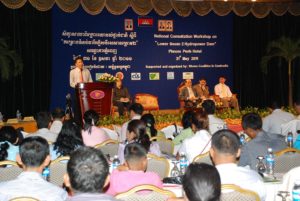 Civil society in Cambodia is typically a very contentious issue. A few months ago, I attempted to dichotomize the diverging opinions on this subject by highlighting the urgent need for NGOs in the developing world whilst pointing out that many of these institutions are fatalities of their own benevolence.
Civil society in Cambodia is typically a very contentious issue. A few months ago, I attempted to dichotomize the diverging opinions on this subject by highlighting the urgent need for NGOs in the developing world whilst pointing out that many of these institutions are fatalities of their own benevolence.
The problem, of course, is rooted in greed, an issue which transcends national borders and language barriers of all kinds. There are myriad NGOs which promote very worthy causes in the developing world, such as gender equality, poverty reduction, and securing access for the most at risk segment of the populous to fundamental human rights. But if there was not a profit to be made – for both individuals and organizations – what incentive is there to devote time and resources to such causes?
The latest accretion to this ambivalent topic comes from The New York Times’ Elizabeth Becker who, in a recent article, laments the new law under consideration by Phnom Penh designed to force NGOs operating in the country to adhere to stricter regulations and “win [the] approval” of the government. As she takes some not-so-subtle jabs at Cambodia’s ruling party, Becker bemoans the revenue to be lost and, as a member of the Board of Directors at Oxfam America, naturally claims that the poor will be the ones who suffer the most.
Her contention does have some merit. Cambodia would not be the first country in the world which uses the democratic process to curtail aspects of democracy. While such duplicitous schemes are usually manifested in referendums on term limits, or nationalistic laws designed to limit criticism from the free press or an opposition figure, it would also be highly doubtful that civil society would be permitted to retain some element of autonomy if the government had the final say on its projects. The very idea of a non-governmental organization is that it is non-governmental. As Virak Ou, the president of the Cambodian Center for Human Rights recently said, “Ultimately, the fear is that the law may be used as a legislative weapon to stifle grassroots democracy and freedom of expression and association in Cambodia, in violation of the Constitution and the principle of the rule of law.”
My argument, on the other hand, is that there is not nearly enough oversight on Cambodian civil society at present. High maintenance costs, and the salaries and benefits of the expatriate staff of Cambodia’s two thousand or so NGOs have not resulted in many benefits for the impoverished segment of the population that civil society is supposed to be helping, despite the prefaced munificence of the various institutions. Ken Silverstein’s brilliant analysis, which I quoted in my previous article, still rings true.
After arriving to provide immediate relief, they gradually transform themselves into survival-focused grant-proposal-writing shops chasing dollars and holding PowerPoint-heavy workshops on “empowerment,” “governance,” “capacity-building.”
There appears to be a perverse “holier than thou” attitude expressed by international aid advocates such as Ms. Becker. I am beginning to suspect that they truly believe that without international assistance, the country will likely collapse. This is an idea postulated by Chris Minko at AFP as well, in which he claims there is a distorted narrative propagated by international aid groups: “After the Khmer Rouge, Cambodia was a disaster until international intervention rescued it in 1991. But evil people (the present government) undid all the good international work, so now the international community needs to intervene again.”
I previously argued that Cambodia would be better served with NGOs operating there, as opposed to without, despite the deficiencies of their altruistic objectives. I used the example of Myanmar to find an appropriate juxtaposition. The military junta there prohibits any type of outside influence; they even initially barred relief agencies from distributing humanitarian aid after the deadly Cyclone Nargis killed over 130,000 people in 2008. My opinion, however, may be changing. Cambodian Prime Minister Hun Sen is surely politicizing the issue to his benefit, despite his claims to the contrary. But more regulation for civil society is needed in Cambodia. That is my revised stance on the issue until further notice.